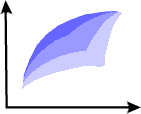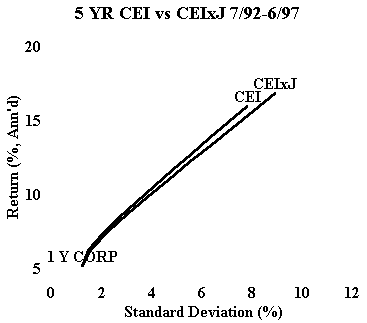- 20% S&P 500 (19.76%)
- 20% US small stocks (DFA US 9-10 Portfolio) (20.85%)
- 15% EAFE-Europe (14.87%)
- 5%EAFE Pac. Ex Japan (14.42%)
- 5% Japan Large (MSCI Japan) (9.13%)
- 10% Continental Small (DFA Cont. Sm. Co. Portfolio) (7.15%)
- 5%UK small (DFA UK Sm. Co. Portfolio (9.24%)
- 5% Japan Small (DFA Jap. Sm. Co. Portfolio) (0.73%)
- 5% Pac. EX Japan small (DFA Pac. Rim Sm. Co. Port., before 1/93 EAFE Pac. X J) (15.47%)
- 10% Latin American (MSCI Lat. Am.) (15.17%)

A Superb Portfolio Needs More Than Just Superb Funds
I genuinely like the Harbor Funds, and admire its President, Ronald Boller. They may not be the best company in mutual fundom, but you can sure see it from there. Consider that their two flagship funds are Harbor International and Harbor Capital Appreciation. Managed since inception by Hakan Castegren, International has beaten its peers by an astonishing annualized 9% since 1988, and the EAFE by even more. In fact, it is one of the few funds whose performance actually shows statistical evidence of skill, rather than random variation. International closed to new investors in 1993, and even Castegren's sales loaded Ivy International closed this year. Their newer International Growth and International II Funds perform almost as well.
Harbor Capital Appreication has bested the S&P by 2% annually over the same period, and leaves its peers in the dust.They also have two excellent bond funds, and a domestic value fund which keeps up fairly well with its peers. Only Harbor Growth lags the averages by a few percent.
Boller is no slouch, either. Well versed in portfolio theory and justifiably proud of his brood, he puts out a quarterly report featuring the returns and SDs of a model portfolio of his funds, graded from 100% stock to 100% bond, and compares it to a passively managed portfolio of Vanguard Index Funds. The stock portion of each portfolio is 70% domestic and 30% foreign, and the bond end is a short/intermediate duration mix. Obviously Mr. Boller expects his model portfolios to be more efficient than the index portfolios.
But wait, something's definitely wrong here in mutual fund paradise. I've plotted the 5 year returns and SDs for the Harbor Funds ("Ha" on the graph), the Vanguard Index Funds ("Va" on the graph) and the CEI for the 5 year period 7/92-6/97.

With such superb fund returns, you'd expect a portfolio made up of the Harbor Funds to be a world beater. Wrong. In fact, the Harbor Fund portfolios get edged out by both the Vanguard Index portfolio and the CEI. For those of you new to the site, the CEI is a non cap weighted global equity index devised on these pages, constituted as follows: (The 5 year returns for 7/92-6/97 are listed in parentheses after each asset.)
Coward's Equity Index (CEI)
So if Harbor has such great funds, how come its fund portfolios don't beat the benchmarks? Well, I'm not completely sure, but I've got a hunch or two. Firstly, I suspect that the Harbor equity portfolio isn't diversified enough. For example, they've largely avoided Japanese equity until recently in their foreign funds. Wait a minute, I hear you say -- avoiding the Nikkei for the past several years wasn't a mistake -- it was a stroke of genius! In fact, what first drew me to the Harbor International Fund in 1988 was its low Japanese exposure -- valuations on the Tokyo market scared the bejabbers out of me. They still do. Surely avoiding Japanese equity would have made any global portfolio more efficient. But in the looking glass world of portfolio theory, things are not always what they seem.
A small portfolio experiment is in order. Consider the composition of the CEI. As you can see above, it is 10% Japanese, split between large and small cap components. The Japanese small cap component by far underperformed every other major sector of the major global equity markets over the past 5 years, and the large cap component was the third worst. Surely eliminating them would have improved portfolio performance. Well, yes and no. In order to investigate portfolio behavior with and sans a Japanese component, the return/SD curve for the CEI with and without Japanese equity was calculated. As always, the CEI is combined with 1 year corporate bonds to produce a spectrum of portfolios according to risk, as was done above.

As can be seen above, removing Japanese equity does enhance return, but it also increases risk. In fact, it can be clearly seen from the plot that even with its miserable returns and very high risk over the past 5 years, a 10% Japanese equity component benefitted risk adjusted portfolio behavior. Now it becomes clearer what the folks at Harbor did wrong. If avoiding doggy Japanese equity was a mistake, then it was a much bigger mistake avoiding domestic small cap stocks , which actually slightly outperformed the highflying S&P over the past 5 years.(Harbor has no small cap fund.) And as long as we're at it, the average 1% expense of their funds, while more than reasonable by industry standards, can't stand up to Vanguard's 0.26% average expense. Lastly, it can be seen from the first graph that the Harbor and Vanguard Bond portfolios, which have a duration of about 2.2 years, engender higher risk than the 1 year corporate strategy used with the CEI, with an adverse effect on portfolio efficiency. This will be discussed in the following article.
I've brought up this issue with Mr. Boller. His response cuts to the heart of the matter:
This is all active management has ever done, in reality. People brag about doing better but usually do not provide a proof statement. We are very proud to be able to return more value to shareholders that they pay us in fees. Remember, the value added over indexes is a zero sum game before fees are subtracted. (Italics mine)Concise, honest, and not terribly charitable to the industry of which he is one of the best specimens. Remember, this guy is no John Bogle type indexing imam -- his rice bowl is the active management of securities.
One further point needs to be made: The fact that I chose to discuss the Harbor Funds in the first place is the result of their superb long term performance; it's data mining of the the worst sort. The message to the small investor here is clear -- the odds that you will be able to prospectively pick a group of actively managed mutual funds which prove more efficient than an indexed global strategy in the long run are slim to none. If Harbor could't get it quite right over the past 5 years, how likely is it that your favorite funds will do so in the next 5?
Well, I think I feel better now about having owned Japanese equity these past few years. I'll probaly still invest with Harbor, too. Now, if I can just get rid of those ole' S&P tracking error blues . . . .
copyright (c) 1997, William J. Bernstein